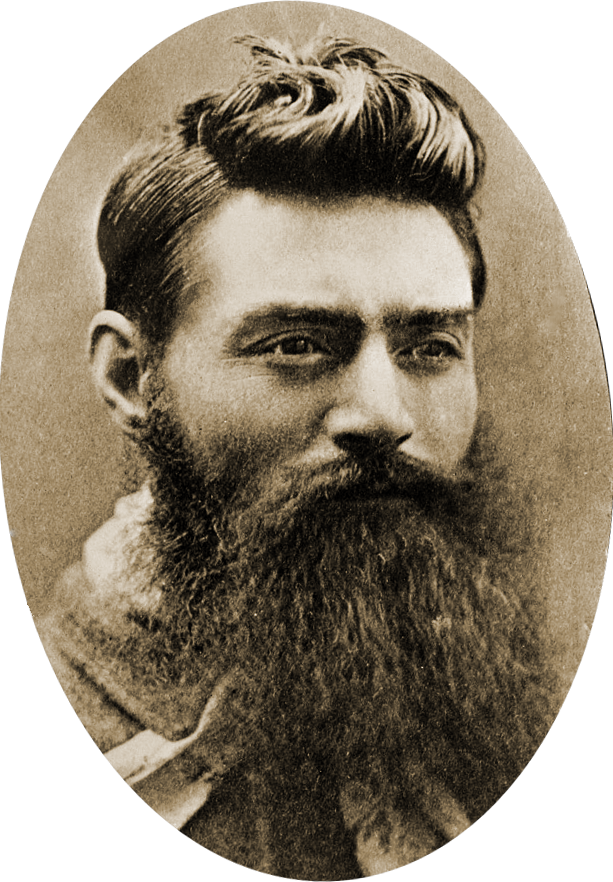Throughout his early life, the Australian state of Victoria was plagued by bushranger Edward “Ned” Kelly. He was the son of an Irish ex-convict who had been sent to Van Diemen's Land on charges of thievery, though many argued he was a patriot who had stood a little too tall. The senior Kelly's vigor-beyond-legality passed on to his son, and Ned was notorious for cunning, while questionable, activities. At age 14, he was arrested for assault (claiming he was defending his sister's honor); at 15, he was again arrested for assault (on a man who had borrowed a horse without permission) and harassing his wife. Kelly himself would be accused of horse-thievery, and, in the resulting altercation with one Constable Hall, he beat Hall and reportedly rode him like a horse. Kelly grew and eventually assumed a career in cattle-rustling.
In what may or may not have been police harassment, Kelly was accused of shooting an officer in the wrist, and so a warrant was put out for his arrest. The Kellies' version of the story was that the constable, Alexander Fitzpatrick, had come asking about Dan Kelly while Ned was gone to New South Wales, made an inappropriate advance on Kate Kelly, and was hit with a coal shovel by the mother, Ellen. Fitzpatrick's doctor noted the smell of alcohol, but Judge Redmond Barry found Ned guilty on scant evidence, prompting a 15-year sentence if he were to be found. Instead, Ned and his brother Dan fled into the bush, later joined by Steve Hart and Joe Byrne.
The Kelly gang was pursued, and a shootout at Stringybark Creek left two officers dead, meaning that Kelly would now be wanted for more than assault. Knowing his life hung on a thread no matter what he did, Kelly turned to daring bank robberies. In Euroa, the gang stole some £2000 while entertaining hostages with horsemanship theatrics. The police scurried to arrest known Kelly sympathizers, but his legend only grew as the government pressed harder. In Jerilderie, they impersonated police officers with uniforms stolen from the local police station, bought hostages drinks, stole another £2000, and burned the mortgage papers of everyone in the town.
On June 27, 1880, the gang, dressed in long, gray cotton coats and large hats, raided Glenrowan. Beneath their clothes, unbeknownst to the police, was armor constructed out of plowshares that weighed nearly 100 pounds and was thick enough to deflect bullets. When police arrived and the shootout began, bullets bounced off Kelly and terrified police. They cried that he was the Devil or a bunyip. Constable Gascoigne hit Kelly point blank, but the man did not fall, and Gascoigne called out that he could not be hurt. Eventually, the volleys caught Kelly in the foot and hand, and he was brought down and arrested.
The rest of his gang had died, Byrne dying from blood loss while Dan Kelly and Steve Hart reportedly committed suicide. Kelly stood before Judge Redmond Barry, the same who had promised to give him 15 years in the original harassment that had sent Kelly into the bush two years before. Barry sentenced Kelly to hang, but at the last moment 30,000 signatures for a stay of sentence were met with an enterprising lieutenant with an idea. In exchange for life imprisonment, Kelly would join in the designs of mass producing his armor for infantry.
Given into permanent custody of Her Majesty's Army, Kelly was taken to London where he and several military engineers reproduced his armor. The original suits had been made on a bush forge, but were of incredible quality, accidentally using the lower temperature and spotty nature of the rough forge to create uneven, more bullet-resistant metal. The armor designs would be put to use in the Boer War, where they would prove useful only in aggressive forward raids. Primarily, the armor was declared useless, though Kelly was maintained in military prison. He spent his time dictating and writing letters from his prison, denouncing the Australian government and arguing for the rights of Irish Catholics throughout the empire.
When the First World War began, trench warfare turned advances into slaughter until Kelly's armor was reintroduced in 1916. At the Battle of the Somme, armor-clad British soldiers stormed across No Man's Land. While many were cut down in the legs by machine gun fire and others simply fell over and were unable to get up, the pushing force overwhelmed German troops and started the general retreat from France that would end the war in 1917.
As Europe breathed between the wars, the Kaiser began a new arms race, developing motorized Panzer that would be emulated by other nations. In 1936, the Second World War would begin due to Germany's move into Austria during socialist riots. The new war would be nothing like the stalemate of the first and spread the deadness of No Man's Land across much of the continent. Kelly would not live to see the massive destruction his idea had caused, having died in prison in 1928, still writing in criticism of abusive tyranny.
–
In reality, Ned Kelly was hanged for murder despite the petition. His mother reminded him to “die like a Kelly,” and Kelly replied to Judge Barry's remark “May God have mercy on your soul”, with “I will go a little further than that, and say I will see you there when I go.” Poetically, Kelly's last words were reported to be, “Such is life.” To this day, Kelly's legendary invulnerability adds another level to his places as a folk hero or a vicious killer.

No comments:
Post a Comment